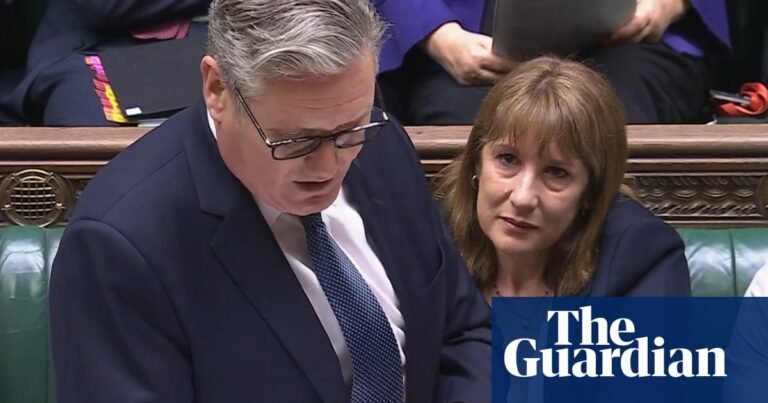Downing Street has insisted Rachel Reeves will stay in post and has not offered her resignation, after the chancellor was in tears at prime minister’s questions on Wednesday.
Reeves wiped away a tear after a series of questions from the Tory leader, Kemi Badenoch, who said Labour MPs had said she was “toast”. Badenoch suggested Keir Starmer had failed to confirm Reeves would stay in post until the election.
Downing Street weighed in immediately behind Reeves, with aides saying she was “going nowhere” and that there would be no reshuffle.
A spokesperson for Reeves said: “It’s a personal matter, which – as you would expect – we are not going to get into. The chancellor will be working out of Downing Street this afternoon.”
Reeves appeared to be upset before prime minister’s questions started. During the 30-minute session, Badenoch said the chancellor looked “absolutely miserable” and described her as a “human shield” for No 10’s incompetence, before pressing Starmer on whether she would be in post at the next election.
After Starmer did not directly reply, Badenoch said: “How awful for the chancellor that he did not confirm she would be in post.”
As Starmer continued to speak, Reeves wiped away a tear. Angela Rayner, the deputy leader, appeared to mouth some words of comfort to her colleague.
Afterwards, a No 10 spokesperson said Reeves had not offered her resignation and she had Starmer’s support for the full parliament.
“The chancellor is going nowhere,” he said. “The chancellor has the prime minister’s full backing. He has said it plenty of times. They are focused entirely on delivering for working people. It’s thanks to the chancellor’s management of the economy that we have managed to restore stability, which has led to four interest rates cuts, wages rising faster than inflation and a spending review investing in Britain’s national renewal.”
Badenoch’s spokesperson responded by saying there was “something very strange going on” and arguing that saying it was a “personal matter doesn’t really clear it up”.
“We need to know what’s going on. You normally tell people what the personal matter is. When the PM’s brother died at Christmas, when Kemi Badenoch’s father died a couple of years ago, you tell them what the personal matter is,” the spokesperson said.
The dramatic moment in the House of Commons came after Starmer withdrew proposed welfare cuts that sparked a rebellion by Labour MPs. The U-turn leaves Reeves with some extremely hard choices in the autumn budget on tax rises and spending priorities, including on the two-child benefit cap.
Earlier on Wednesday, sources close to the chancellor said she would have to underline to MPs that there was now £5bn less to spend on other priorities, which would have consequences for other measures, including the £3.5bn cost of scrapping the unpopular two-child cap on benefit payments.
The Treasury and No 10 have not definitively ruled out a change to the two-child rule but said the chaotic reversal on welfare cuts on Tuesday night would have a major impact.
The second reading of the government’s welfare bill passed its first Commons test only after a central element – changes to personal independence payments – was removed. The bill passed with a rebellion of 49 Labour MPs, more than three times more than the government’s previous biggest rebellion.
Pat McFadden, the Cabinet Office minister, said on Wednesday morning that there were now tough choices to be made. “In any budgetary decision, there’s definitely a cost to what was announced yesterday, and you can’t spend the same money twice, so more money spent on that means less for some other purpose,” he told the BBC.
While economists including the Institute for Fiscal Studies have focused on the need for the chancellor to raise taxes at the budget, Treasury sources said there would also be implications for spending priorities, including ones popular with Labour MPs.
“We’re not going to bluff this, we’re not going to hide it. We’re going to be clear there is a financial cost to this,” said one ally. “Labour MPs need to understand that. Of course, tax is one of the levers we could have to pull. We’re not going to duck that.
“Those Labour MPs and charities and others who want the two-child limit lifted – how are you going to pay for it now? Labour MPs made a choice last night and the government accepted that choice, but we are going to be honest that that choice comes at cost, because it does.”
They said they would not countenance further changes to the fiscal rules. “That means more debt interest, taxpayers’ money going to hedge funds. Is that a progressive thing?”
No definitive plans are yet in motion for how to fill the hole left by the welfare U-turn. A Treasury source said it would depend on future economic growth, as well as oil prices and receipts the Treasury receives from its clampdown on tax evasion.
